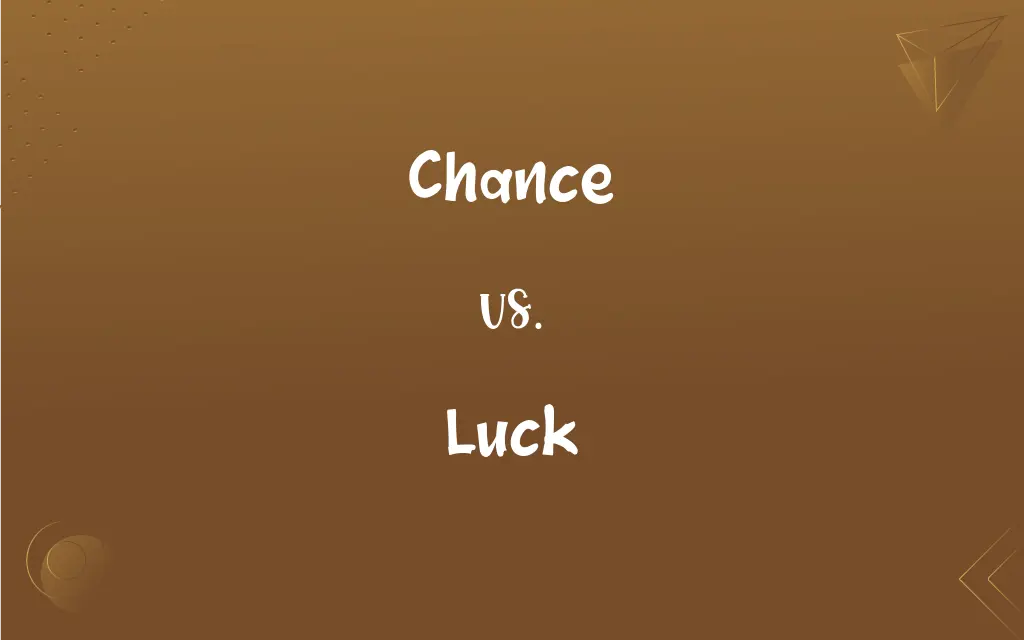Chance vs. Luck: What's the Difference?
Edited by Janet White || By Harlon Moss || Updated on November 3, 2023
Chance refers to the possibility of something happening, while luck is the success or failure brought by chance rather than one's actions.

Key Differences
Chance is a concept that relates to the likelihood of events occurring. It is often expressed in terms of probability or odds. When someone takes a chance, they engage in an action or behavior that has an uncertain outcome. Luck, on the other hand, is a more abstract concept that describes the outcome of an event that appears to be governed by chance. It is often seen as a force that causes good or bad things to happen to people.
The usage of the word "chance" can imply a neutral stance towards the outcome of an event, suggesting that there is an equal possibility of various outcomes. For example, when a coin is flipped, there is an equal chance of it landing on heads or tails. The term "luck" is typically used post-event and is often associated with a positive outcome, as in being lucky, or a negative one, as in bad luck. Luck is frequently considered to be out of one's control and is sometimes thought to be influenced by fate or destiny.
In mathematics and science, chance is quantifiable and can be calculated using statistics and probability theory. There is no place for luck in these calculations; the term is more commonly used in a casual or superstitious context. For instance, a scientist would speak of the chance of an atom decaying within a certain period, never its luck.
While chance is often used in a context where risk and opportunity are weighed (taking a chance), luck is generally reflective and is often invoked to explain the past rather than predict the future. People say they had the luck of the draw after outcomes are known, not typically before.
Although both chance and luck are integral to games of risk and gambling, they play different roles. A player may calculate their chances of winning in a game, but they might also need a bit of luck to actually succeed. In this realm, chance can be somewhat managed or calculated while luck remains the unpredictable element that can change fortunes in an instant.
ADVERTISEMENT
Comparison Chart
Definition
The possibility of something happening.
The force that causes things to happen.
Control
Can sometimes be calculated or influenced.
Generally considered beyond control.
Context
Often used before an event.
Usually referenced after the event.
Measurement
Can be expressed in terms of probability.
Not quantifiable; often seen as random.
Association
With opportunities and risks.
With outcomes, either positive or negative.
ADVERTISEMENT
Chance and Luck Definitions
Chance
Possibility.
There's a good chance we'll be late.
Luck
Serendipity.
They met by pure luck.
Chance
Risk.
They decided to chance the rough seas.
Luck
Good Fortune.
She thanked her luck when she found her lost ring.
Chance
Opportunity.
He took a chance on a new business venture.
Luck
Success.
His luck at cards was astonishing.
Chance
Randomness.
The lottery is a game of pure chance.
Luck
Random Favor.
He had the luck of the Irish with him.
Chance
Probability.
The chance of rain today is high.
Luck
Favorable Outcome.
Her luck in the interview landed her the job.
Chance
The unknown and unpredictable element in happenings that seems to have no assignable cause.
Luck
The chance happening of fortunate or adverse events; fortune
They met one day out of pure luck.
Luck
Good fortune or prosperity; success
We wish you luck.
FAQs
Do people have control over chance?
They can influence it in some contexts, like strategic decision-making.
Can chance be calculated precisely?
In many cases, yes, through statistics and probability.
Are luck and hard work related?
Hard work can create opportunities, but luck is often seen as a separate factor.
Can taking a chance lead to success?
Yes, if the outcome is favorable.
Is luck just a matter of perspective?
Perspective can influence how one interprets random events as luck.
Is chance always about probability?
Yes, it often involves the likelihood of events.
Can you improve your luck?
Luck is random, but some believe in enhancing it through various means.
Can someone be naturally lucky?
It's a common belief, but there's no scientific basis for it.
Is taking a chance always risky?
Taking a chance involves some level of uncertainty and risk.
Is luck the same as destiny?
Luck is random and momentary, while destiny implies a predetermined outcome.
Can chance events be predicted?
To some extent, via probability, but not with certainty.
Can you increase your chances of winning?
In some games, strategic play can increase winning chances.
Does luck play a role in games of chance?
Yes, luck can influence the outcome of such games.
Is it possible to have zero chance?
If an event is impossible, the chance is indeed zero.
Is it better to be lucky or good?
It depends on the context; skill and luck can both be valuable.
Is there such a thing as a luck factor?
Some studies suggest a psychological aspect to feeling lucky.
Are some people born lucky?
Luck isn't hereditary; it's a concept applied to random success.
Does chance favor the prepared mind?
Preparation can position one to take advantage of opportunities.
Can luck change over time?
As a concept based on random chance, luck can fluctuate.
Do lucky charms work?
There's no evidence they affect luck, but they may boost confidence.
About Author
Written by
Harlon MossHarlon is a seasoned quality moderator and accomplished content writer for Difference Wiki. An alumnus of the prestigious University of California, he earned his degree in Computer Science. Leveraging his academic background, Harlon brings a meticulous and informed perspective to his work, ensuring content accuracy and excellence.
Edited by
Janet WhiteJanet White has been an esteemed writer and blogger for Difference Wiki. Holding a Master's degree in Science and Medical Journalism from the prestigious Boston University, she has consistently demonstrated her expertise and passion for her field. When she's not immersed in her work, Janet relishes her time exercising, delving into a good book, and cherishing moments with friends and family.































































